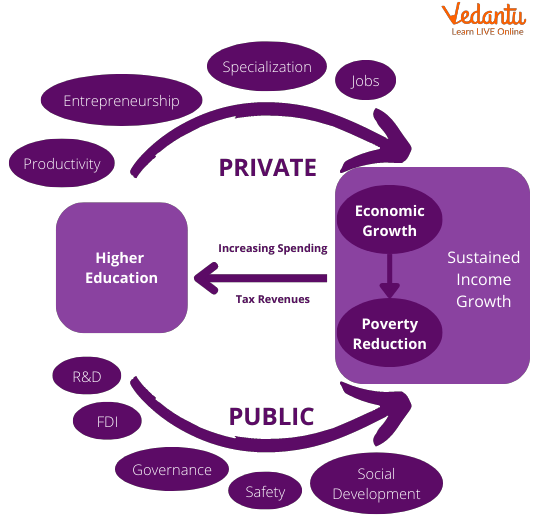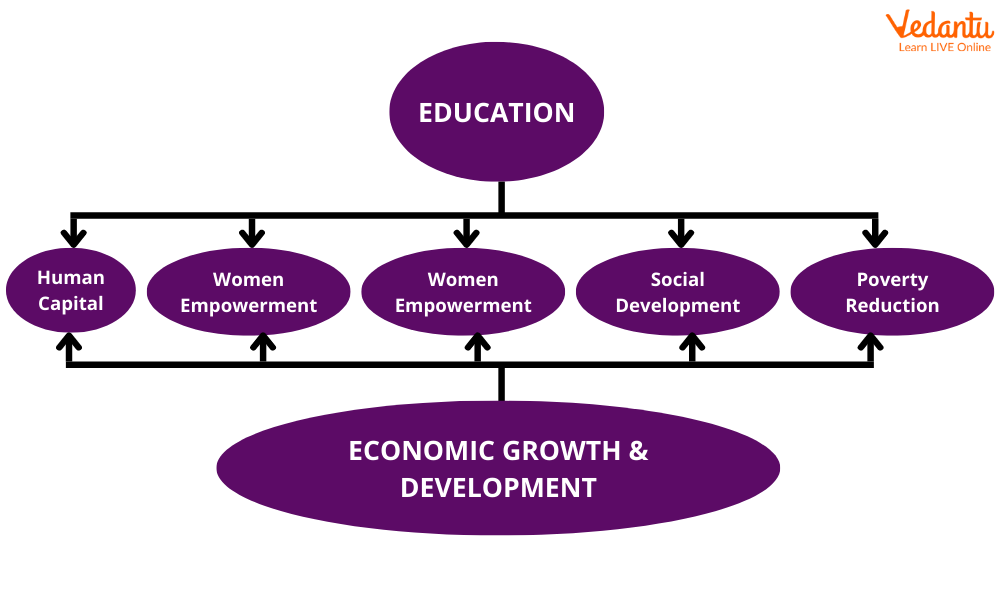




What Does Economics of Education Mean?
Education Economics is a very new and diverse field of study. The significance of comprehensive research into economic elements of education was recognised in the mid-twentieth century. The many economic components of education vary in each country, depending on their economic system, economic growth, and development. For example, rich countries invest more in education than developing countries. The association between economic expansion and educational advancement in countries is always seen positively. It is a specialist field of study that applies economic principles, theories, and dilemmas to the subject of education.
Advantages of Education for a Country
Globalisation and international commerce necessitate competition among countries and their economy. Although a single country seldom specialises in a single industry, economically successful countries will have competitive and comparative advantages over other economies.
The quantity of educated workers boosts the economy's production because competent people can execute activities more effectively.
Equal education and employment opportunities for people of all genders, races, ages, and ethnicities increase the value of an economy. A typical developed economy would feature a diverse range of industries, each with its own set of competitive advantages and disadvantages in the global marketplace.
The education and training of a country's workers are a crucial component in influencing the performance of the country's economy.
How Employment Training Affects the Economy
A successful economy has a workforce capable of running industries at a level that gives it a competitive advantage over other nations' economies. Nations may experiment with rewarding training through tax breaks, offering training facilities, or a number of other methods to develop a better competent workforce. While an economy is unlikely to have a competitive edge in all businesses, it can focus on a few industries where competent individuals are more easily taught. Training levels are a crucial element between developed and developing countries. As a result, because of those competent employees, comparable enterprises may cluster in the same geographic region - an example being Silicon Valley, Calif.
Employers' Guide: Employers like employees that are productive and require less supervision. When selecting whether or not to pay for staff training, employers must evaluate a variety of variables, including employees that refuse to take training may be encountered by businesses.
For Employees: Workers boost their earning potential by expanding and honing their abilities and skills. The more they know about a certain job’s function and particular sector, the more valuable they become to an employer. Employees may wish to acquire advanced methods or new abilities in order to compete for a higher salary. Usually, employees may anticipate their salaries to improve, although at a lesser proportion than the productivity increases by businesses.
Regarding the Economy: Many nations have prioritised the development of an education system capable of producing people capable of functioning in emerging industries such as science and technology. This is due in part to older sectors in rich nations being less competitive and so less likely to continue dominating the industrial landscape. When economists talk about "education," they don't just mean college degrees. Levels of education are frequently used:
Primary - elementary school in the United States
Secondary - middle school, high school, and preparatory school
University, community college, and trade school are all examples of post-secondary education. As a result, many governments support elementary and secondary education in order to increase economic performance.

Employment Training Affects the Economy
How Does Education Contribute to Economic Growth?
Education does not necessarily result in greater pay for all employees in the United States. According to the Economic Policy Institute, black employees confront considerable and rising pay disparities, with black males earning just 71 cents and black women earning only 64 cents for every $1 earned by white men.
These discrepancies exist at all employment levels, from low income to high wage, but are greatest in top-paying industries due to a lack of representation of black employees in those fields. The disparities remain across all levels of education: black employees with high school, college, and advanced degrees earn just 81.7%, 77.5%, and 82.4% of what White workers with the same degree earn, respectively.
Black employees with a bachelor's degree had the same unemployment rate as white workers without a college education.

Education and Economic Growth
Linkage Between Education and Economic Growth
Expecting to establish a correlation between education and economic growth is based on two fundamental premises. First, on the broadest scale, it makes intuitive sense that the rise in living standards over the past several years has been mostly attributed to education. The illiterate cultures that have slowly assimilated into the global economy over the past two decades did not experience the same growth of nature that Europe has seen. The evolution of science and how education has contributed to the growth of knowledge, in the eyes of the casual observer, are typically correlated. Education and knowledge are required to both profit from and contribute to scientific progress. Second, on a more specific level, a wide range of econometric research shows that the wages that individuals may grab are dependent on their degree of education.
Conclusion
The workforce's knowledge and skills are important factors of the firm and economic success. Higher-value-added industries, such as high-tech manufacturing, are usually successful in economies with a large supply of skilled people obtained from both formal education and vocational training. All citizens must have access to education and training that may help employees, companies, and the overall economy. Governments must ensure this through laws and employment creation programmes.
FAQs on Education's Role in Economic Growth
1. What is the fundamental link between education and economic growth?
Education directly fuels economic growth by enhancing a nation's human capital. It equips individuals with the knowledge, skills, and critical thinking abilities necessary to innovate, improve productivity, and adapt to new technologies. This leads to a more efficient workforce and the creation of new industries, driving overall economic expansion.
2. How does education specifically impact a nation's economic development?
Education significantly impacts a nation's economic development by fostering social mobility and reducing poverty. It enhances the productive capacity of the workforce, leading to higher incomes and improved living standards. A well-educated populace also contributes to technological advancements, better governance, and increased national competitiveness in the global economy.
3. In what ways does the level of education influence a country's economic progress?
The level of education within a country directly influences its economic progress by determining the quality of its labour force. Higher educational attainment generally correlates with increased individual earnings, greater innovation, and the ability to move towards more complex, high-value industries. This allows economies to transition from basic production to knowledge-based growth.
4. How does the National Education Policy (NEP) contribute to India's economic growth?
The National Education Policy (NEP) 2020 aims to boost India's economic growth by focusing on holistic, multidisciplinary, and skill-based education. It emphasizes developing critical thinking, creativity, and vocational skills, aligning education with industry needs. This prepares a future-ready workforce, enhancing productivity and innovation, which are crucial for sustainable economic expansion.
5. Beyond general education, what is the significance of skill development for India's economic advancement?
Beyond general education, skill development is crucial for India's economic advancement because it bridges the gap between academic knowledge and industry requirements. Specialized skills directly enhance employability and productivity, addressing the demands of specific sectors. This leads to higher economic output, reduced unemployment, and a more competitive workforce capable of contributing to emerging industries.
6. What distinguishes "economic education" from broader education, and why is it important for economic stability?
Economic education focuses specifically on principles of economics, financial literacy, and market dynamics, unlike broader education. It is vital for economic stability because it equips individuals with the understanding to make informed financial decisions, participate effectively in the economy, and comprehend government policies. This knowledge fosters a more stable and efficient economic environment.
7. Can you explain how education acts as a key driver of economic growth from a Class 12 Economics perspective?
From a Class 12 Economics perspective, education acts as a key driver of economic growth primarily through human capital formation. It increases the productive capacity of the labour force, leading to higher output and innovation. Education also facilitates technological absorption and diffusion, which are essential for long-term growth and can help achieve more inclusive development by improving opportunities for all sections of society.
8. Why is investment in human capital through education considered a foundational pillar for sustainable economic growth?
Investment in human capital through education is foundational for sustainable economic growth because it creates a continuous cycle of improvement. Educated individuals are more adaptable, innovative, and capable of higher productivity, leading to sustained economic expansion rather than temporary boosts. It ensures long-term competitiveness and resilience against economic shocks.
9. What are the primary challenges countries face in effectively utilizing education to boost their economic prosperity?
Countries often face several challenges in leveraging education for economic prosperity, including:
- Access and Equity: Ensuring all citizens, regardless of background, have equal access to quality education.
- Quality and Relevance: Aligning curricula with market demands and ensuring high teaching standards.
- Funding: Securing adequate and sustained investment in educational infrastructure and resources.
- Brain Drain: Retaining skilled professionals within the country.
10. How does education contribute to reducing income inequality and fostering inclusive economic development?
Education contributes to reducing income inequality by enhancing the skills and employability of individuals from disadvantaged backgrounds, increasing their earning potential. It provides access to better job opportunities and promotes social mobility, thereby breaking cycles of poverty. This fosters more inclusive economic development where benefits are shared across broader segments of society.
11. Beyond direct economic contributions, what indirect benefits does a well-educated population bring to a society's overall progress?
Beyond direct economic contributions, a well-educated population fosters numerous indirect benefits, including improved public health outcomes, increased civic participation, and stronger social cohesion. It also leads to greater environmental awareness, reduced crime rates, and a more informed citizenry, all of which contribute to a society's overall progress and well-being.
12. What are the potential economic consequences if a nation underinvests in its educational infrastructure?
If a nation underinvests in its educational infrastructure, the potential economic consequences are severe. These include a decline in human capital, leading to lower productivity and slower economic growth. It can result in higher unemployment, particularly among the youth, reduced innovation, and a significant loss of international competitiveness. Such underinvestment can also lead to a "brain drain" as skilled individuals seek opportunities elsewhere.























